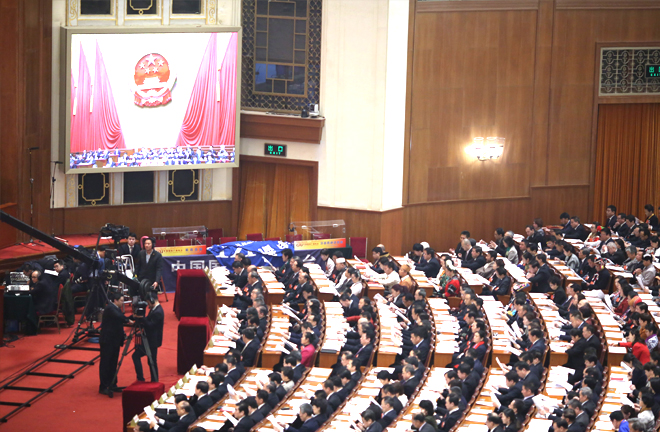Academics offer advice on how humanities, social sciences can serve the new era

The annual Two Sessions provide a platform for academics to offer advice on important national issues. (WANG ZHOU/CSST)
During the annual Two Sessions of the NPC and CPPCC, academics have provided suggestions on advancing humanities and social sciences to serve the needs of the new era, with some focusing on specific examples in some research fields.
At present, accelerating the construction of philosophy and social sciences with Chinese characteristics is facing greater opportunities and challenges. “We must build a philosophy and social science system that is commensurate with China’s international status and historical accumulation,” said NPC Deputy Wang Wei, a Member of the Chinese Academy of Social Sciences.
While the economic status of China is obvious to all, its philosophy and social sciences must make further efforts to achieve corresponding status. Philosophers and social scientists should have a keen eye to discover international dynamics and domestic experiences, and offer advice through various forms, such as think tanks and reports, Wang said.
“Going global,” enhancing China’s soft power and increasing its international influence need to be achieved with support from all disciplines, and scholars need to make unremitting efforts to achieve their professional status in the international arena, Wang said.
NPC Deputy Zhao Guoxiang, secretary of the CPC Committee at Henan Normal University, said the new practice calls for accelerating the construction of the philosophy and social sciences with Chinese characteristics and guiding the national economy and social development with ideological theories that have richer content and more vivid expressions. In this process, philosophers and social scientists should play five roles: inheritors of national culture, innovators of the ideological theory, leaders of social progress, proponents of cultural power, and communicators of the Chinese voice.
The development level of a country depends not only on the level of natural sciences but also on the level of development of philosophy and social sciences, said CPPCC Member Liu Xianzhong, a research fellow at the Institute of Russian, Eastern European and Central Asian Studies at the Chinese Academy of Social Sciences. He suggested increasing support for basic research in those fields, especially the humanities discipline, providing an excellent research environment for academics who are engaged in basic research or some obscure fields.
Liu also said that it is necessary to increase basic research on China’s diplomatic relations with neighboring countries and other major countries in the world. As China’s international influence continues to rise and international exchanges become more frequent, it is necessary to take precautions in the study of diplomatic relations. A basic task in the study of the history of diplomatic relations is to collect archives and information. It is important to organize researchers to do so and have a talent pool so that they can “get something out” when needed.
Known as a “mural doctor,” NPC Deputy Su Bomin, director of the Conservation Research Institute at the Dunhuang Academy China, along with his colleagues, has been engaged in the protection and repair of murals for decades. He said protection of cultural relics cannot be reduced to restoration technique. It is a systematic science.
Right now, it is necessary to pay more attention to theoretical research related to protection of cultural relics and the training of specialized talent, Su said. He suggested that the national authorities in charge of science and technology strategies add the basic research on science and technology of cultural relic protection as a new direction, and support cultural relic protection as an independent subject of interdisciplinary research.
Wang also has proposed to increase support for cultural relic management agencies at the grassroots level. Currently, more than 2,000 counties across China have established protection sites of cultural relics, but some are virtually useless. Museums in some counties have few relics and a shortage of professionals. This is not commensurate with the general trend of promoting cultural prosperity and development. As such, it is necessary to effectively increase support and do a good job in the aspects of salary, staffing and funding.
(edited by JIANG HONG)
